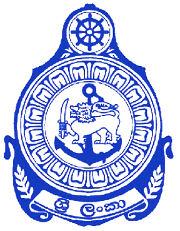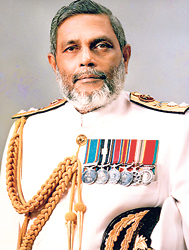
The Liberation Tigers of Tamil Eelam was a Tamil militant organization that was based in the northern and eastern Sri Lanka. The LTTE fought to create an independent Tamil state called Tamil Eelam in the northeast of the island in response to violent persecution and discriminatory policies against Sri Lankan Tamils by the Sinhalese-dominated Sri Lankan Government.

The Sri Lankan Civil War was a civil war fought in Sri Lanka from 1983 to 2009. Beginning on 23 July 1983, it was an intermittent insurgency against the government by the Liberation Tigers of Tamil Eelam led by Velupillai Prabhakaran. The LTTE fought to create an independent Tamil state called Tamil Eelam in the north-east of the island, due to the continuous discrimination and violent persecution against Sri Lankan Tamils by the Sinhalese-dominated Sri Lanka government.
Vinayagamoorthy Muralitharan is a Sri Lankan politician and former militant. Formerly a fighter for the Tamil separatist group, the Liberation Tigers of Tamil Eelam (LTTE), for over 20 years, Muralitharan later rose to prominence after defecting from the LTTE and forming the Tamil Makkal Viduthalai Pulikal (TMVP), a breakaway faction of the LTTE.

Mullaitivu is the main town of Mullaitivu District, situated on the north-eastern coast of Northern Province, Sri Lanka. A largely fishing settlement, the town in the early twentieth century grew as an anchoring harbour of the small sailing vessels transporting goods between Colombo and Jaffna. The town has a District Secretary's office, many other government institutions and schools located in and around the area.

A military reserve force is a military organization whose members (reservists) have military and civilian occupations. They are not normally kept under arms, and their main role is to be available when their military requires additional manpower. Reserve forces are generally considered part of a permanent standing body of armed forces, and allow a nation to reduce its peacetime military expenditures and maintain a force prepared for war. During peacetime, reservists typically serve part-time alongside a civilian job, although most reserve forces have a significant permanent full-time component as well. Reservists may be deployed for weeks or months-long missions during peacetime to support specific operations. During wartime, reservists may be kept in service for months or years at a time, although typically not for as long as active duty soldiers.

The Sri Lanka Navy (SLN) is the naval arm of the Sri Lanka Armed Forces and is classed as the country's most vital defence force due to its island geography and is responsible for the maritime defence of the Sri Lankan nation and its interests. The role of the Sri Lanka Navy is to conduct operations at sea for the defence of the nation and its interests and conduct prompt and sustainable combat operations at sea in accordance with the national policies.
Militant use of children in Sri Lanka has been an internationally recognized problem since the inception of the Sri Lankan civil war in 1983. The primary recruiters of under the age of 18 children are the rebel LTTE movement and the Karuna group, a break-away faction of the LTTE working with Sri Lanka Forces. Human Rights Watch criticized that threats and intimidation were used by the LTTE to force Tamil families in Sri Lanka to furnish children for military duty. When families reject, their children are sometimes kidnapped at night from their homes or forced recruited while walking to school. Parents who refuse to allow their children to be recruited suffer retaliation by the Tamil Tigers, which may include violence or detention.
Eelam War I is the name given to the initial phase of the armed conflict between the government of Sri Lanka and the LTTE.

Eelam War II is the name given to the second phase of armed conflict between Sri Lankan military and the separatist Liberation Tigers of Tamil Eelam. The war started after the failure of peace talks between the Premadasa government and the LTTE. This phase of the war was initiated by the LTTE who massacred almost 600 Sinhalese and Muslim police personnel after they were ordered by the Premadasa government to surrender to the LTTE. The truce was broken on June 10, 1990 when the LTTE in October expelled all the 28,000 Muslims residing in Jaffna.

The Department of Civil Security is an auxiliary force administered by the Ministry of Defence.

Admiral Wannakuwatta Waduge Erwin Clancy Fernando VSV, USP, MNI was a senior Sri Lanka Navy officer. He served as the Commander of the Sri Lanka Navy from 1 November 1991 to 16 November 1992, when he was assassinated by the LTTE he was the most senior officer in the Sri Lankan armed forces to be killed in the line of duty.
Operation Liberation also known as the Vadamarachchi Operation was the military offensive carried out by the Sri Lankan Armed Forces in May and June 1987 to recapture the territory of Vadamarachchi in the Jaffna peninsula from the LTTE. At the time it was the largest combined services operation undertaken by the armed forces deploying multiple brigade size formation, becoming the first conventional warfare engagement on Sri Lankan soil after the end of British colonial rule. The operation involved nearly 4,000 troops, supported by ground-attack aircraft, helicopter gunships and naval gun boats. The offensive achieved its primary objective, however operations were suspended when the Indian government dropped food supplies over Jaffna in Operation Poomalai on June 4, 1987, which prompted the Sri Lankan government to accept the Indo-Sri Lankan Accord.
The war was waged for over a quarter of a century, with an estimated 70,000 killed by 2007. Immediately following the end of war, on 20 May 2009, the UN estimated a total of 80,000–100,000 deaths. However, in 2011, referring to the final phase of the war in 2009, the Report of the Secretary-General's Panel of Experts on Accountability in Sri Lanka stated, "A number of credible sources have estimated that there could have been as many as 40,000 civilian deaths." The large majority of these civilian deaths in the final phase of the war were said to have been caused by indiscriminate shelling by the Sri Lankan Armed Forces.

The Sri Lanka Armed Forces is the overall unified military of the Democratic Socialist Republic of Sri Lanka encompassing the Sri Lanka Army, the Sri Lanka Navy, and the Sri Lanka Air Force; they are governed by the Ministry of Defence (MoD). The three services have around 346,700 active personnel; conscription has never been imposed in Sri Lanka. As of 2021 it is the 14th largest military in the world, with 1.46% of the Sri Lankan population actively serving.
War crimes during the final stages of the Sri Lankan Civil War are war crimes and crimes against humanity which the Sri Lanka Armed Forces and the Liberation Tigers of Tamil Eelam have been accused of committing during the final months of the Sri Lankan Civil War in 2009. The war crimes include attacks on civilians and civilian buildings by both sides; executions of combatants and prisoners by both sides; enforced disappearances by the Sri Lankan military and paramilitary groups backed by them; sexual violence by the Sri Lankan military; the systematic denial of food, medicine, and clean water by the government to civilians trapped in the war zone; child recruitment, hostage taking, use of military equipment in the proximity of civilians and use of forced labor by the Tamil Tigers.
The Lessons Learnt and Reconciliation Commission was a commission of inquiry appointed by Sri Lankan President Mahinda Rajapaksa in May 2010 after the 26-year-long civil war in Sri Lanka to function as a Truth and reconciliation commission. The commission was mandated to investigate the facts and circumstances which led to the failure of the ceasefire agreement made operational on 27 February 2002, the lessons that should be learnt from those events and the institutional, administrative and legislative measures which need to be taken in order to prevent any recurrence of such concerns in the future, and to promote further national unity and reconciliation among all communities. After an 18-month inquiry, the commission submitted its report to the President on 15 November 2011. The report was made public on 16 December 2011, after being tabled in the parliament.

General L. D. E. Cecil Waidyaratne, VSV, USP was a Sri Lanka Army general. He was 12th Commander of the Sri Lankan Army and a former Sri Lankan Ambassador to Thailand.
Terrorism in Sri Lanka has been a highly destructive phenomenon during the 20th and 21st centuries, especially so during the periods of the Sri Lankan Civil War (1983–2009) and the first (1971) and second JVP insurrections (1987–1989). A common definition of terrorism is the systematic or threatened use of violence to intimidate a population or government for political, religious, or ideological goals. Sri Lanka is a country that has experienced some of the worst known acts of modern terrorism, such as suicide bombings, massacres of civilians and assassination of political and social leaders. Terrorism has posed a significant threat to the society, economy and development of the country. The Prevention of Terrorism Act of 1978 is the legislation that provides the powers to law enforcement officers to deal with issues related to terrorism in Sri Lanka. It was first enacted as a temporary law in 1979 under the presidency of J. R. Jayewardene, and later made permanent in 1982.
The Mullivaikkal massacre was the mass killing of tens of thousands of Sri Lankan Tamils in 2009 during the closing stages of the Sri Lankan Civil War, which ended in May 2009 in a tiny strip of land in Mullivaikkal, Mullaitivu.

The bombing of SLNS Sooraya and SLNS Ranasuru was an attack carried out on 19 April 1995 by LTTE suicide frogmen of the Sea Tigers, who attacked and sank two Sri Lanka Navy gun boats moored in the harbor of Trincomalee, Sri Lanka by planting explosives on them.











